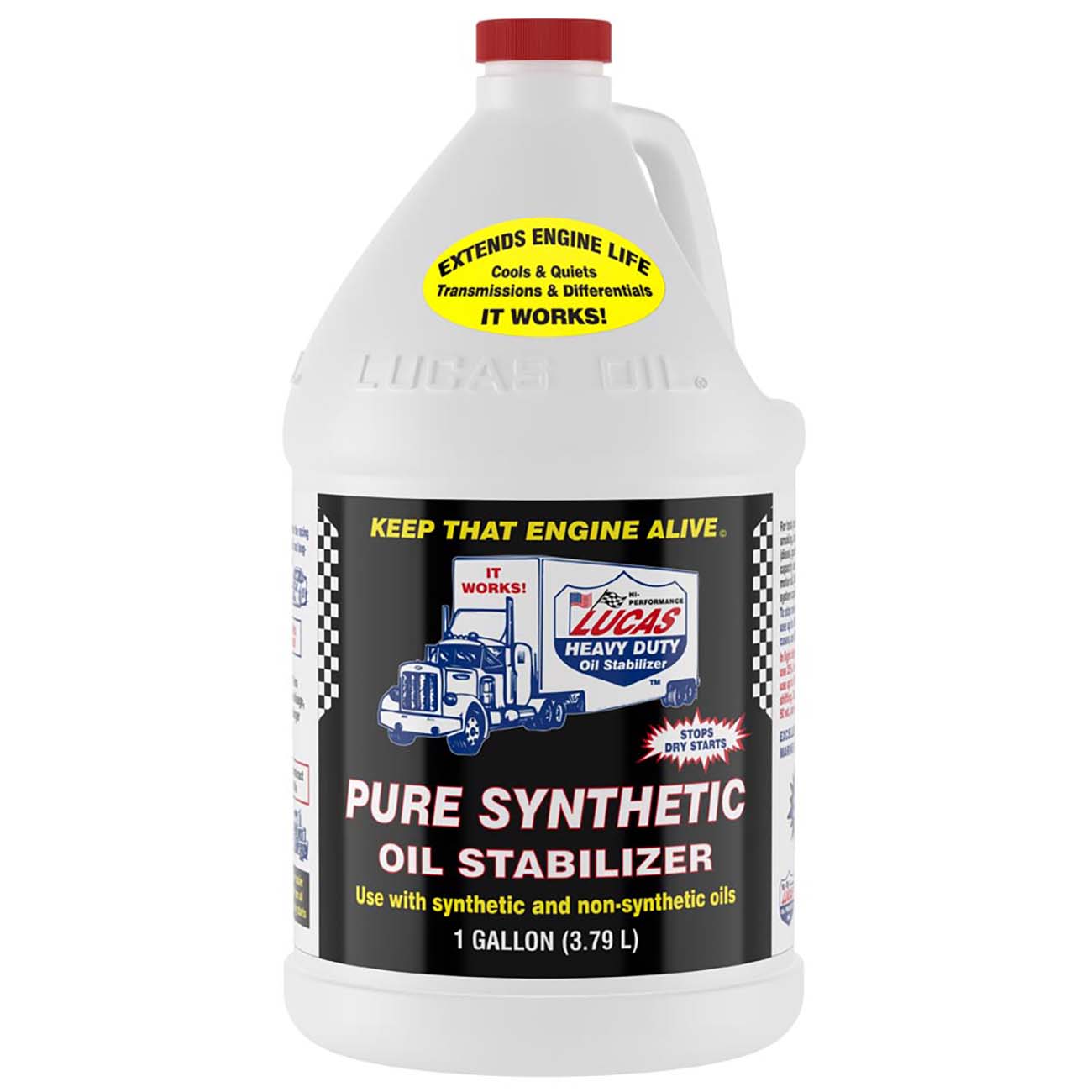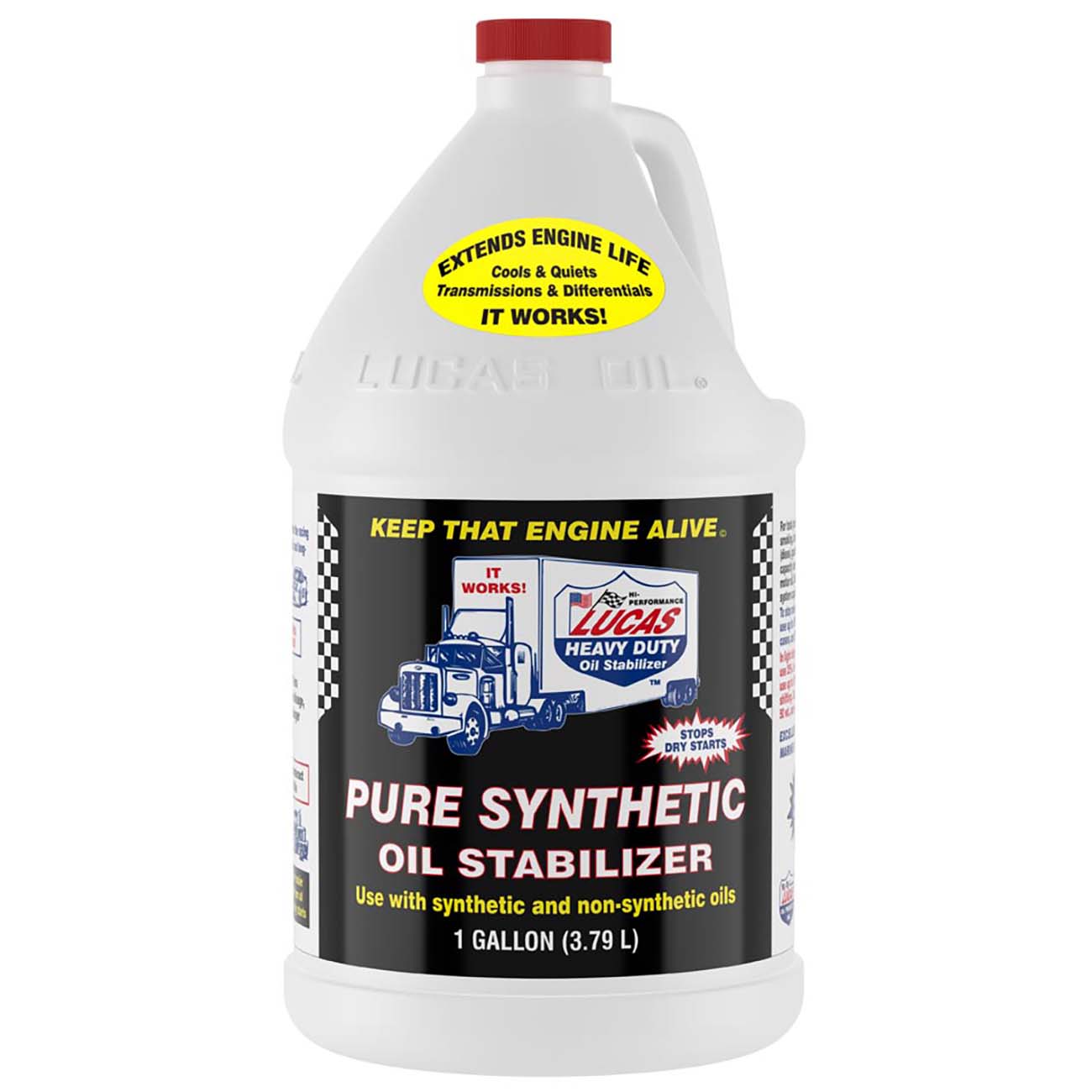Answer
Aug 28, 2024 - 03:51 PM
Using the 1-gallon Lucas Oil Stabilizer is appropriate in several situations to enhance engine and gear oil performance, reduce friction and wear, and improve overall engine and component life. Here are some scenarios when it is suitable to use Lucas Oil Stabilizer:
1. High-Mileage or Worn Engines:- Purpose: Lucas Oil Stabilizer is especially beneficial for high-mileage or older engines that may experience increased wear and oil consumption. It helps to reduce engine noise, oil consumption, and smoking by increasing the viscosity of the oil and improving its lubricating properties.
- When to Use: If your engine has over 75,000 miles or exhibits signs of wear, such as burning oil, low oil pressure, or excessive engine noise, adding Lucas Oil Stabilizer can help extend the engine’s life and improve performance.
- Purpose: For engines that burn oil or have minor leaks, Lucas Oil Stabilizer can help reduce oil consumption by thickening the oil, reducing leaks, and improving the seal performance.
- When to Use: If you notice that your engine consumes more oil between oil changes or has minor leaks, using Lucas Oil Stabilizer can help reduce these issues and maintain oil levels.
- Purpose: Lucas Oil Stabilizer is beneficial in extreme operating conditions, such as high temperatures or heavy loads, where additional lubrication protection is needed to prevent wear and tear.
- When to Use: If you operate your vehicle in extreme temperatures, heavy towing, or off-road conditions, adding Lucas Oil Stabilizer can provide extra protection against oil breakdown and improve lubrication.
- Purpose: Incorporating Lucas Oil Stabilizer into your routine oil change regimen can provide continuous protection and lubrication enhancement throughout the oil's life.
- When to Use: Add the stabilizer to your engine oil during each oil change to maintain optimal oil performance and engine protection.
- Purpose: Vehicles used for severe service, such as commercial trucks, heavy-duty trucks, or construction equipment, often operate under high-stress conditions. Lucas Oil Stabilizer can help reduce wear and protect against heavy loads, high RPMs, and prolonged idling.
- When to Use: If your vehicle or equipment operates under severe conditions regularly, using the oil stabilizer can help maintain engine integrity and prolong service life.
- Purpose: Lucas Oil Stabilizer can be used in manual transmissions and differentials to reduce gear noise, improve shifting, and extend the life of the components by providing additional lubrication and reducing heat.
- When to Use: Add stabilizer to the gear oil in manual transmissions or differentials, especially if you experience gear noise, difficulty shifting, or need extra protection under heavy loads.
- Purpose: Lucas Oil Stabilizer helps improve oil flow and lubrication at low temperatures, reducing wear during cold starts.
- When to Use: In cold climates or winter months, adding the stabilizer can help protect your engine during cold starts, reducing friction and wear.
- Purpose: Lucas Oil Stabilizer can provide additional lubrication during the break-in period of a new or rebuilt engine, helping to protect new components and reduce initial wear.
- When to Use: During the first few hundred miles of a new or rebuilt engine, using Lucas Oil Stabilizer can help ensure proper lubrication and protection of engine components.
- Purpose: If you're using lower viscosity oils (such as 5W-20 or 5W-30) for fuel efficiency, adding Lucas Oil Stabilizer can enhance the oil's film strength and lubrication properties.
- When to Use: In engines requiring lower viscosity oils but needing additional protection under high stress, adding a stabilizer can improve oil performance without significantly increasing oil viscosity.
- Engines Under Warranty: Some vehicle manufacturers recommend against using aftermarket oil additives, especially if the vehicle is under warranty. Check your owner's manual or consult with the dealer.
- Engines with Modern, Low-Viscosity Oil Requirements: Some newer engines are specifically designed to use low-viscosity oils for fuel efficiency and may not benefit from thickened oil. Always check your vehicle’s specifications.
- Synthetic Oil Use: While Lucas Oil Stabilizer is compatible with synthetic oils, some synthetic oils already contain additives that enhance lubrication. Adding more stabilizer may not be necessary.
Lucas Oil Stabilizer can be an excellent additive for enhancing engine and gear oil performance, especially in high-mileage or severe-service applications. Use it to reduce wear, improve lubrication, and extend the life of your engine and transmission components under appropriate conditions. However, always check your vehicle’s owner manual and consult with a professional mechanic if unsure about using oil additives.





Add New Comment